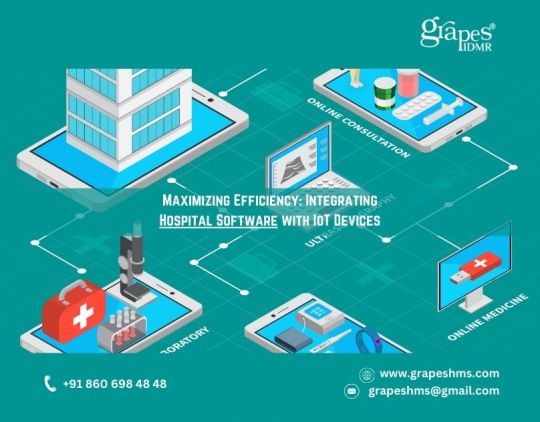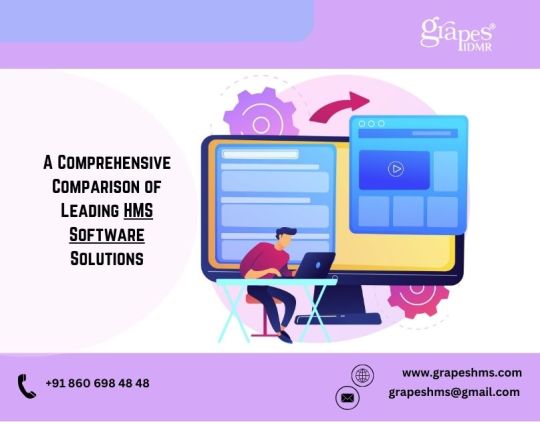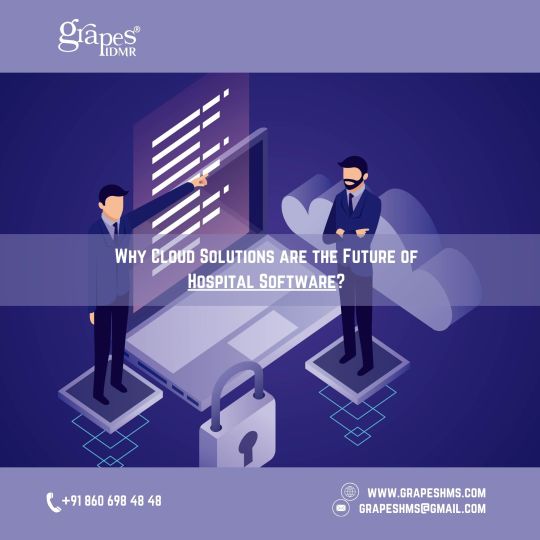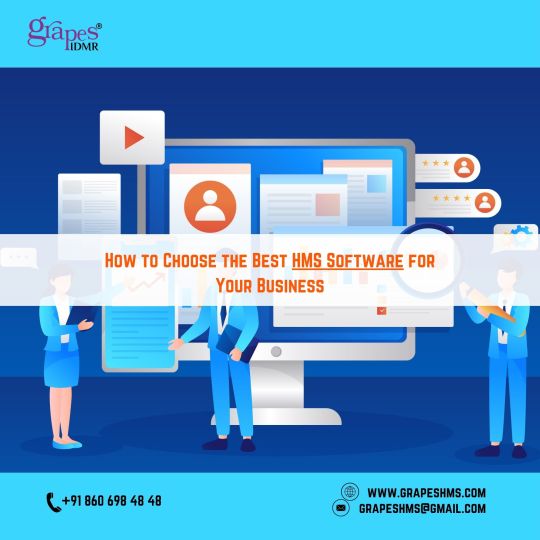#MRDManagement
Text
Maximizing Efficiency: Integrating Hospital Software with IoT Devices

In today's rapidly evolving healthcare landscape, the integration of hospital software with Internet of Things (IoT) devices is revolutionizing patient care delivery, operational efficiency, and overall healthcare outcomes. By harnessing the power of IoT technology, healthcare organizations can maximize efficiency, streamline workflows, and enhance patient experiences. Let's explore the benefits and implications of integrating hospital software with IoT devices.
Real-Time Patient Monitoring:
Hospital software integrated with IoT devices enables real-time monitoring of patient vital signs, activities, and health metrics.
IoT sensors embedded in medical devices, wearables, and patient monitoring systems capture data continuously and transmit it directly to the hospital software platform.
Healthcare providers gain instant access to critical patient information, allowing for timely interventions, proactive care management, and improved clinical outcomes.
Enhanced Asset Management:
IoT-enabled hospital software facilitates the tracking and management of medical equipment, supplies, and assets within healthcare facilities.
RFID tags, sensors, and beacons embedded in equipment and inventory items enable automated asset tracking, location monitoring, and inventory management.
Healthcare organizations can optimize asset utilization, reduce equipment downtime, and minimize inventory stockouts by leveraging real-time data insights provided by IoT-integrated hospital software.
Improved Facility Operations:
Hospital software integrated with IoT devices streamlines facility operations and maintenance processes, leading to increased efficiency and cost savings.
IoT sensors deployed throughout healthcare facilities monitor environmental conditions, energy usage, and equipment performance in real-time.
Facility managers can proactively identify maintenance issues, optimize energy consumption, and ensure regulatory compliance by leveraging data-driven insights from IoT-enabled hospital software.
Remote Patient Care and Telemedicine:
IoT-integrated hospital software enables remote patient monitoring and telemedicine consultations, expanding access to healthcare services and improving patient engagement.
IoT-enabled wearable devices, home monitoring kits, and telehealth platforms facilitate virtual consultations, remote diagnostics, and medication adherence monitoring.
Healthcare providers can deliver personalized care plans, monitor patients' progress remotely, and intervene as needed, resulting in better health outcomes and reduced hospital readmissions.
Predictive Analytics and Preventive Care:
Hospital software integrated with IoT devices leverages data analytics and machine learning algorithms to predict and prevent adverse events and medical complications.
IoT sensors capture and analyze vast amounts of patient data, including physiological parameters, lifestyle factors, and environmental triggers.
Healthcare organizations can identify patterns, trends, and risk factors early on, enabling proactive interventions, personalized treatment plans, and preventive care strategies to improve patient health and wellness.
In conclusion, integrating hospital software with IoT devices offers tremendous potential for maximizing efficiency, improving patient care, and transforming healthcare delivery. By harnessing real-time data insights from IoT-enabled devices, healthcare organizations can enhance clinical workflows, optimize resource utilization, and deliver more personalized and proactive care to patients. Embracing IoT integration in hospital software is not just a technological advancement but a strategic imperative for driving innovation and achieving excellence in today's dynamic healthcare environment.
#HMS#hmssoftware#hospitalsoftware#HealthcareManagementsystem#Healthcare#HospitalManagementSystem#HospitalManagement#BSA#GrapesHMS#MIS#EMR#GrapesIDMR#Grapes#HealthcareManagementSystemsoftware#Software#SoftwareSolution#Doctor#PatientRegistration#IPDManagement#OPDManagement#IDMR#Labmanagement#NursingStation#Dietmanagement#MRDManagement#BloodBank#Linenmanagement#HRManagement#Pharmacy#Radiology
0 notes
Text
A Comprehensive Comparison of Leading HMS Software Solutions

Choosing the best hospital management software (HMS software) for your healthcare organization is a crucial decision that requires careful evaluation of various factors. To assist you in this process, we have conducted a comprehensive comparison of leading HMS software solutions, highlighting their key features, functionalities, and benefits.
Epic Systems Corporation
Features: Epic offers a comprehensive suite of HMS software solutions, including electronic health records (EHR), patient scheduling, billing, and clinical decision support.
Functionality: Epic's software is highly customizable and scalable, catering to the needs of small clinics and large healthcare systems.
Benefits: Epic's HMS software is renowned for its interoperability, enabling seamless integration with other healthcare systems and facilitating collaborative care delivery.
Cerner Corporation:
Features: Cerner's HMS Software encompasses EHR, revenue cycle management, population health management, and telehealth capabilities.
Functionality: Cerner's software is known for its robust clinical decision support tools, data analytics capabilities, and patient engagement solutions.
Benefits: Cerner's HMS Software streamlines workflows, improves clinical outcomes, and enhances patient satisfaction through personalized care delivery and proactive population health management.
Allscripts Healthcare Solutions:
Features: Allscripts offers an integrated suite of HMS software solutions, including EHR, practice management, revenue cycle management, and patient engagement tools.
Functionality: Allscripts' software prioritizes interoperability, enabling seamless data exchange between disparate systems and enhancing care coordination across healthcare settings.
Benefits: Allscripts' HMS Software empowers healthcare organizations to deliver high-quality, patient-centered care, improve operational efficiency, and achieve better clinical and financial outcomes.
Meditech:
Features: Meditech provides a comprehensive suite of HMS software solutions, including EHR, patient registration, scheduling, billing, and clinical decision support.
Functionality: Meditech's software is designed to streamline clinical workflows, enhance patient safety, and optimize revenue cycle management through integrated, user-friendly interfaces.
Benefits: Meditech's HMS Software offers scalability, flexibility, and interoperability, enabling healthcare organizations to adapt to changing needs, improve care coordination, and achieve meaningful use of health IT.
NextGen Healthcare:
Features: NextGen offers a suite of HMS software solutions, including EHR, practice management, revenue cycle management, and population health management.
Functionality: NextGen's software prioritizes usability, interoperability, and data analytics, empowering healthcare organizations to drive better clinical and financial outcomes.
Benefits: NextGen's HMS Software enables healthcare organizations to optimize workflows, improve care quality, and enhance patient engagement through personalized, data-driven care delivery.
In conclusion, each of these leading HMS software solutions offers unique features, functionalities, and benefits to meet the diverse needs of healthcare organizations. When choosing the best HMS software for your business, consider factors such as interoperability, scalability, usability, and alignment with your organization's strategic objectives. By conducting a comprehensive comparison and selecting the HMS software solution that best fits your organization's needs, you can drive innovation, improve patient care, and achieve success in today's dynamic healthcare landscape.
#HMS#hmssoftware#hospitalsoftware#HealthcareManagementsystem#Healthcare#HospitalManagementSystem#HospitalManagement#BSA#GrapesHMS#MIS#EMR#GrapesIDMR#Grapes#HealthcareManagementSystemsoftware#Software#SoftwareSolution#Doctor#PatientRegistration#IPDManagement#OPDManagement#IDMR#Labmanagement#NursingStation#Dietmanagement#MRDManagement#BloodBank#Linenmanagement#HRManagement#Pharmacy#Radiology
0 notes
Text
Why Cloud Solutions are the Future of Hospital Software

In today's rapidly evolving healthcare landscape, the adoption of cloud-based solutions is reshaping the way hospital software is deployed, managed, and utilized. Cloud solutions offer numerous advantages over traditional on-premises software, making them the future of hospital software. Let's explore why cloud solutions are leading the way in revolutionizing hospital software and driving innovation in the healthcare industry.
Enhanced Accessibility and Flexibility:
Cloud-based hospital software provides healthcare organizations with unparalleled accessibility and flexibility. Unlike traditional on-premises solutions, which are limited to specific physical locations or devices, cloud solutions can be accessed from anywhere with an internet connection. This enables healthcare professionals to access patient information, collaborate with colleagues, and perform critical tasks from the hospital, clinic, or even remotely, improving workflow efficiency and responsiveness to patient needs.
Scalability and Agility:
Cloud solutions offer unmatched scalability and agility, allowing healthcare organizations to scale their software infrastructure up or down based on changing needs and demands. Whether expanding services, adding new users, or integrating with additional systems, cloud-based hospital software can adapt quickly and seamlessly to accommodate growth and evolution. This scalability enables healthcare organizations to stay agile, responsive, and competitive in a dynamic healthcare environment without the constraints of traditional hardware limitations.
Cost-Effectiveness and Efficiency:
Cloud solutions offer significant cost savings and operational efficiencies compared to traditional on-premises software deployments. With cloud-based hospital software, healthcare organizations can avoid hefty upfront investments in hardware infrastructure, software licenses, and IT personnel required for on-premises deployments. Instead, they can benefit from a pay-as-you-go subscription model, where they only pay for the resources and services they use, eliminating unnecessary expenses and reducing total cost of ownership over time.
Improved Security and Compliance:
Contrary to common misconceptions, cloud solutions offer robust security measures and compliance capabilities that meet or exceed those of traditional on-premises deployments. Leading cloud providers invest heavily in state-of-the-art security technologies, data encryption, access controls, and compliance certifications to protect sensitive patient information and ensure regulatory compliance. By leveraging the expertise and resources of cloud providers, healthcare organizations can enhance data security, reduce risk, and maintain compliance with industry regulations such as HIPAA and GDPR.
Seamless Updates and Maintenance:
Cloud-based hospital software eliminates the burden of manual updates, patches, and maintenance tasks typically associated with on-premises deployments. Cloud providers handle software updates and maintenance automatically, ensuring that healthcare organizations always have access to the latest features, enhancements, and security patches without disrupting operations. This seamless update process minimizes downtime, enhances system reliability, and enables healthcare organizations to focus on delivering quality patient care rather than managing IT infrastructure.
In conclusion, cloud solutions are the future of hospital software, offering unparalleled accessibility, scalability, cost-effectiveness, security, and efficiency compared to traditional on-premises deployments. By embracing cloud-based hospital software, healthcare organizations can unlock new opportunities for innovation, collaboration, and growth while enhancing patient care delivery and driving operational excellence in the digital age. Embracing cloud solutions is not just a technological upgrade but a strategic imperative for healthcare organizations looking to thrive in an increasingly interconnected and data-driven healthcare landscape.
#HMS#hmssoftware#hospitalsoftware#HealthcareManagementsystem#Healthcare#HospitalManagementSystem#HospitalManagement#BSA#GrapesHMS#MIS#EMR#GrapesIDMR#Grapes#HealthcareManagementSystemsoftware#Software#SoftwareSolution#Doctor#PatientRegistration#IPDManagement#OPDManagement#IDMR#Labmanagement#NursingStation#Dietmanagement#MRDManagement#BloodBank#Linenmanagement#HRManagement#Pharmacy#Radiology
0 notes
Text
How to Choose the Best HMS Software for Your Business

Selecting the right hospital management software (HMS software) is a critical decision for healthcare organizations, as it directly impacts patient care, operational efficiency, and overall success. With numerous options available on the market, choosing the best HMS software can be a daunting task. Here are some key factors to consider when evaluating and selecting the best HMS software for your business:
Define your requirements:
Before exploring HMS software options, it's essential to clearly define your organization's requirements, goals, and priorities. Consider factors such as the size of your organization, specialty areas, workflow complexities, regulatory compliance needs, and integration requirements with existing systems. Identifying specific features and functionalities that are essential for your business will help narrow down your options and ensure that the chosen HMS software aligns with your organization's objectives.
Assess Ease of Use and User Experience:
The best HMS software should be intuitive, user-friendly, and easy to navigate for healthcare professionals and staff members. Look for software solutions that offer a modern interface, customizable dashboards, and workflow automation features that streamline tasks and reduce manual effort. Consider conducting demos or trials of potential HMS software solutions to evaluate the user experience firsthand and assess how well the software aligns with your organization's workflow and user preferences.
Evaluate integration capabilities:
Integration with existing systems and technologies is crucial for seamless data exchange, interoperability, and workflow continuity. Evaluate the integration capabilities of HMS software solutions and ensure compatibility with your organization's electronic health records (EHR) systems, laboratory information systems (LIS), billing platforms, and other third-party applications. Choose HMS software that supports industry-standard protocols such as HL7 and FHIR and offers flexible integration options to meet your organization's unique needs.
Consider scalability and flexibility.
As your organization grows and evolves, your HMS software should be able to scale and adapt to changing needs and requirements. Assess the scalability and flexibility of potential HMS software solutions to accommodate future expansion, additional users, and new functionalities. Look for software vendors that offer modular solutions, customizable features, and flexible licensing options that can be tailored to your organization's size and growth trajectory.
Prioritize data security and compliance:
Data security and regulatory compliance are paramount in healthcare, and HMS software must adhere to stringent standards to protect patient information and ensure compliance with regulations such as HIPAA, GDPR, and HITECH. Evaluate the security measures and compliance features of HMS Software solutions, including data encryption, access controls, audit trails, and regular security updates. Choose HMS software vendors with a proven track record of prioritizing data security and compliance in their software development and implementation processes.
Assess vendor reputation and support:
Selecting a reputable HMS software vendor with a track record of success and a strong commitment to customer support is essential for a successful implementation and long-term partnership. Research vendor credentials, customer reviews, and case studies to gauge their reputation and reliability. Additionally, inquire about the level of customer support, training resources, and ongoing maintenance and support services offered by the vendor to ensure that your organization receives the necessary assistance and guidance throughout the implementation process and beyond.
In conclusion, choosing the best HMS software for your business requires careful consideration of your organization's requirements, user experience, integration capabilities, scalability, data security, vendor reputation, and support services. By assessing these key factors and conducting thorough research and evaluation, you can select an HMS software solution that aligns with your organization's objectives, enhances patient care delivery, and drives operational efficiency in the rapidly evolving healthcare landscape.
#HMS#hmssoftware#hospitalsoftware#HealthcareManagementsystem#Healthcare#HospitalManagementSystem#HospitalManagement#BSA#GrapesHMS#MIS#EMR#GrapesIDMR#Grapes#HealthcareManagementSystemsoftware#Software#SoftwareSolution#Doctor#PatientRegistration#IPDManagement#OPDManagement#IDMR#Labmanagement#NursingStation#Dietmanagement#MRDManagement#BloodBank#Linenmanagement#HRManagement#Pharmacy#Radiology
0 notes